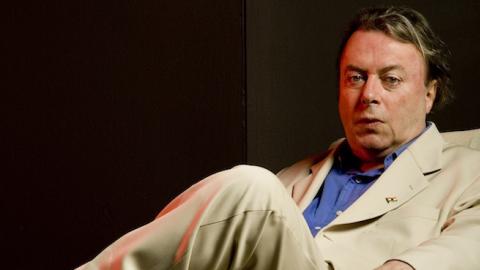Lebanese media reports that the man who hit the late Christopher Hitchens in an altercation in Beirut in 2009 has been killed in Syria, fighting alongside forces allied with Syrian president Bashar al-Assad. Adonis Nasr, an information officer with the Syrian Social Nationalist Party (SSNP), often boasted of slapping Hitchens, after the British-American author defaced a placard commemorating an SSNP "hero" who killed two Israeli soldiers in a Wimpy's restaurant in 1982.
Hitchens wasn't a big fan of Israel, and his gesture certainly wasn't intended to defend Israel's invasion and occupation of Lebanon. He just despised fascists and rightly interpreted the SSNP's ideology and symbols as fascist, so when he saw the SSNP's version of a swastika in the Hamra section of Beirut, he was moved to act. As Hitchens later wrote for Vanity Fair:
Well, call me old-fashioned if you will, but I have always taken the view that swastika symbols exist for one purpose only—to be defaced. Telling my two companions to hold on for a second, I flourish my trusty felt-tip and begin to write some offensive words on the offending poster. I say "begin" because I have barely gotten to the letter k in a well-known transitive verb when I am grabbed by my shirt collar by a venomous little thug, his face glittering with hysterical malice. With his other hand, he is speed-dialing for backup on his cell phone. As always with episodes of violence, things seem to slow down and quicken up at the same time: the eruption of mayhem in broad daylight happening with the speed of lightning yet somehow held in freeze-frame. It becomes evident, as the backup arrives, that this gang wants to take me away.
Hitchens' two companions that day were Jonathan Foreman and Michael Totten, who lived in Beirut for a time and understood the urgency of the situation. Here's an excerpt from Totten's account:
Christopher was encircled by four or five of them. They were geared up to smash him, and I reached for his hand to pull him away. One of the toughs clawed at my arm and left me with a bleeding scratch and a bruise. I expected a punch in the face, but I wasn't the target.
Christopher was the target. He was the one who had defaced their sign. One of the guys smacked him hard in the face. Another delivered a roundhouse kick to his legs. A third punched him and knocked him into the street between two parked cars. Then they gathered around and kicked him while he was down. They kicked him hard in the head, in the ribs, and in the legs….
Then the universe all of a sudden righted itself.
Christopher managed to pull himself up as a taxi approached in the street. I stepped in front of the car and forced the driver to stop. "Get in!" I yelled. Christopher got in the car. Jonathan got in the car. I got in the car. We slammed down the locks on the doors with our fists. The street was empty of traffic. The way in front of the taxi was clear. The scene for our escape was set.
This was two years before the start of the war in Syria, where Hitchens's assailant would eventually meet his end. I doubt that Hitchens would've celebrated the man's death, a gesture without echo waged on behalf of an evil cause. But it hardly would've surprised him. A neighborhood bully who bragged about slapping a journalist died defending an authoritarian regime that incited a rebellion against it by firing on unarmed protestors nearly five years ago.
Hitchens understood the stakes very clearly. As he told Totten:
I think a swastika poster is partly fair game and partly an obligation. You don't really have the right to leave one alone. … My line is that swastika posters are to be defaced or torn down. I mean, what other choice do you have? I'd like to think I'd have done that if I had known it was being guarded by people who are swastika fanciers. I have done that in my time. I have had fights with people who think that way.
What would have surprised Hitchens, who died months after the March 2011 uprising began, is that his adopted country, a nation he loved not least because of its historical record fighting totalitarianisms and authoritarianisms of every variety, would turn its back on the victims of Assad and his allied forces. It would have surprised him that the White House protected Assad by ensuring that no U.S.-backed rebels would attack the regime slaughtering them, only ISIS. And that the White House enabled the Syrian despot by filling the coffers of his Iranian financiers with billions of dollars in sanctions relief.
That boot that Orwell warned of, stomping on a human face? Imagine what Hitchens would've thought of an American president—one who prides himself on being on the right side of history—who tied its laces.
















